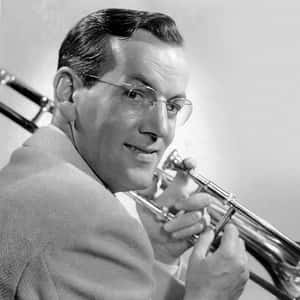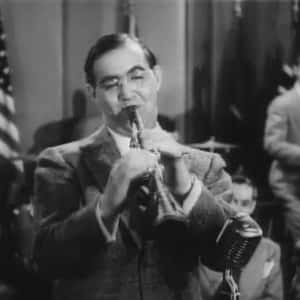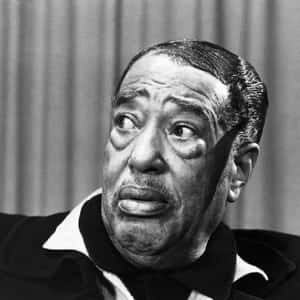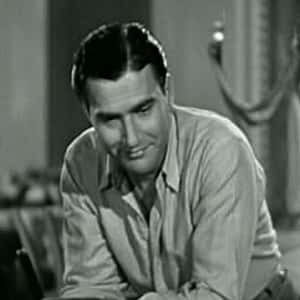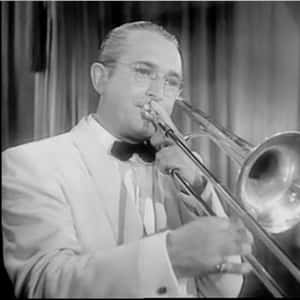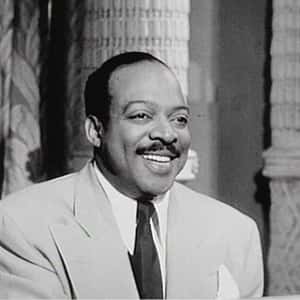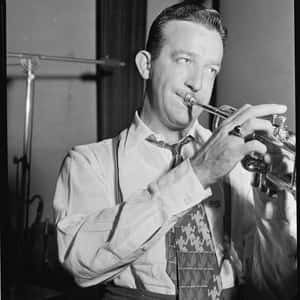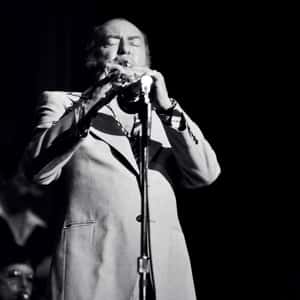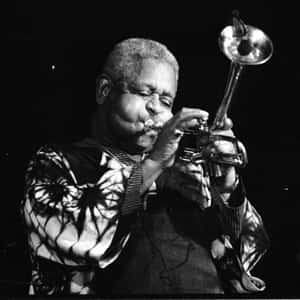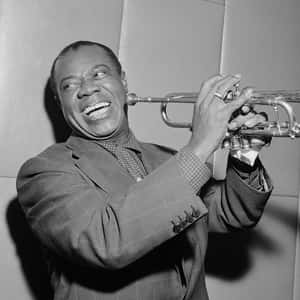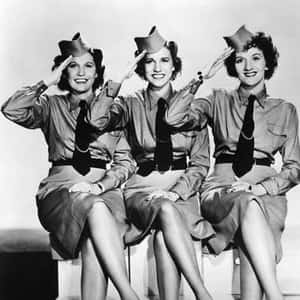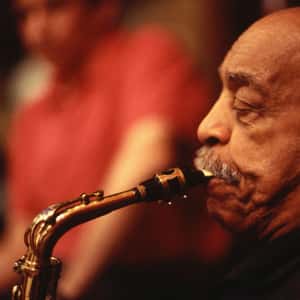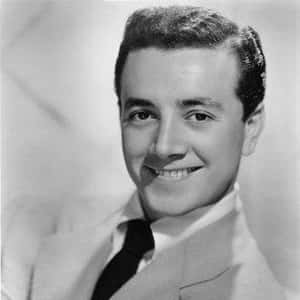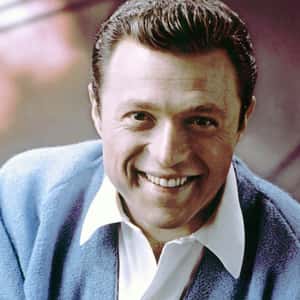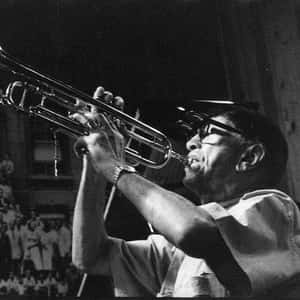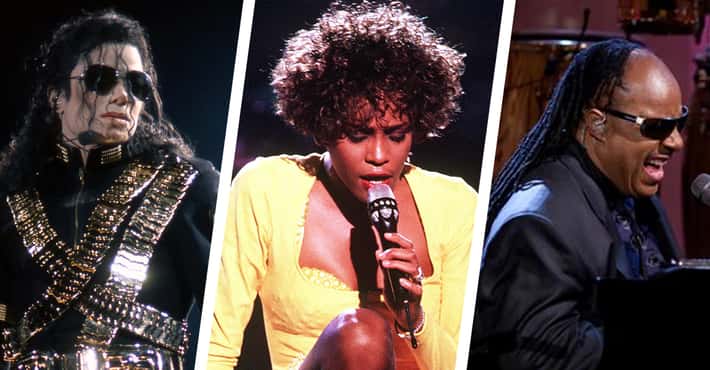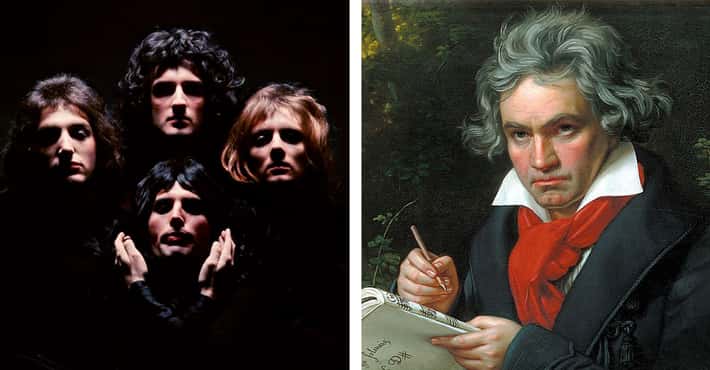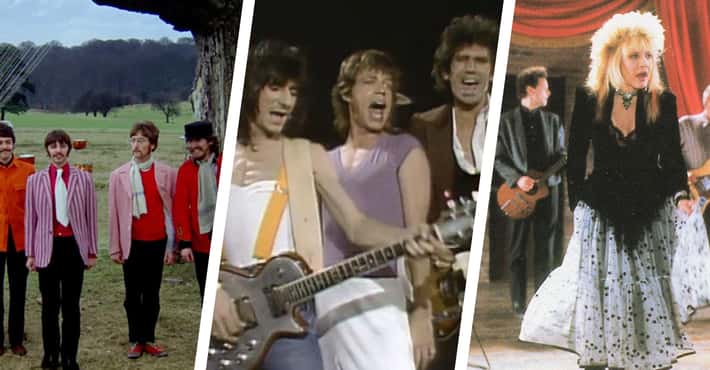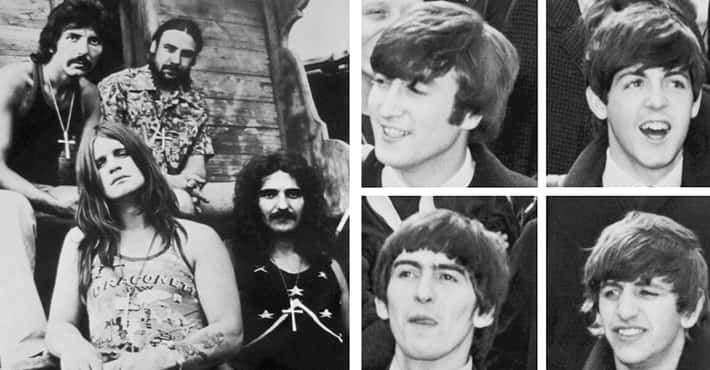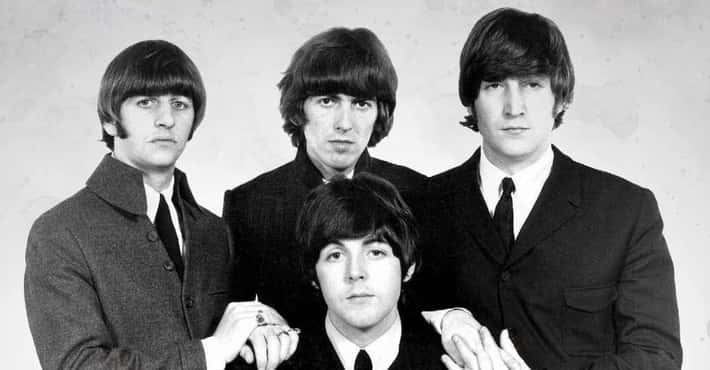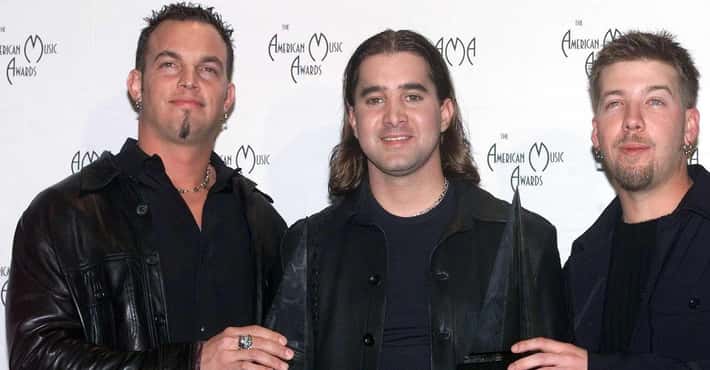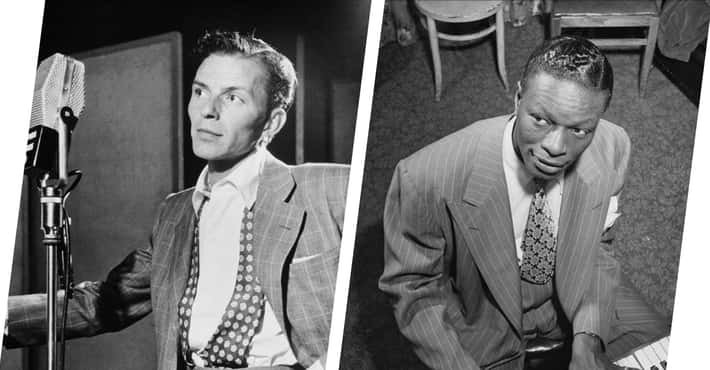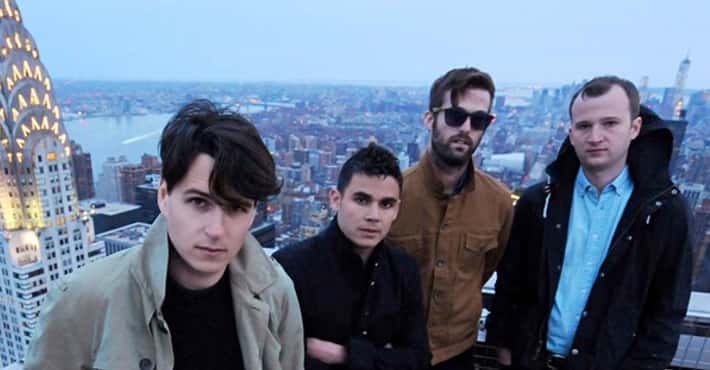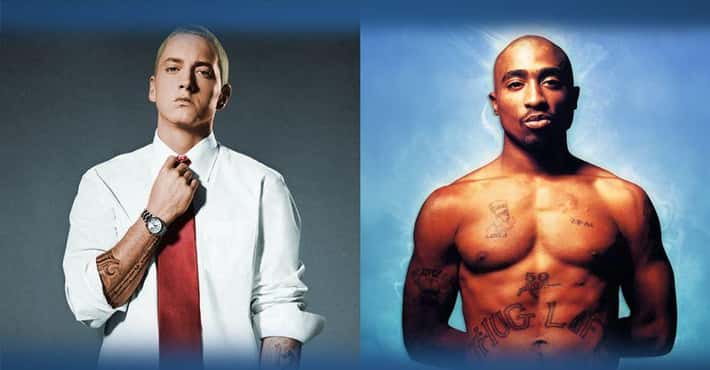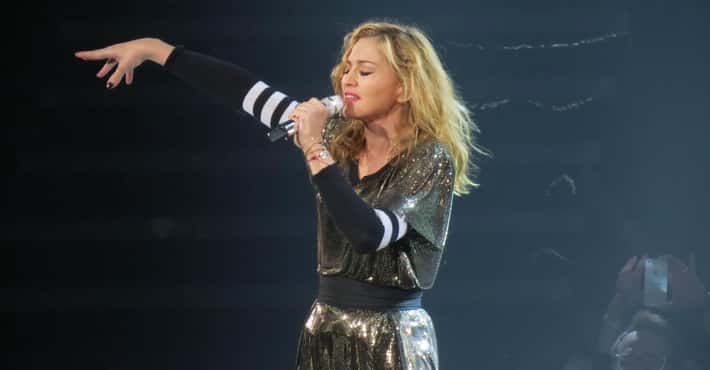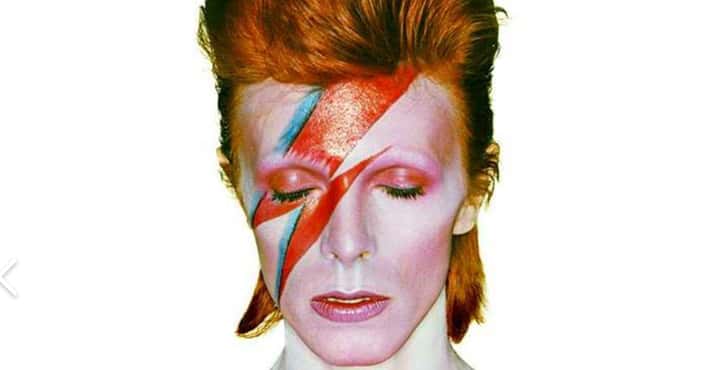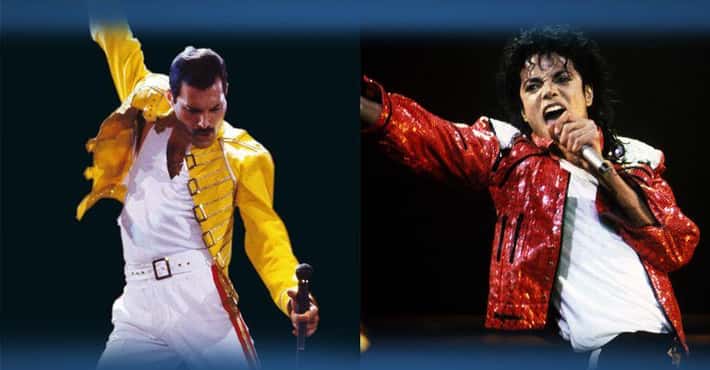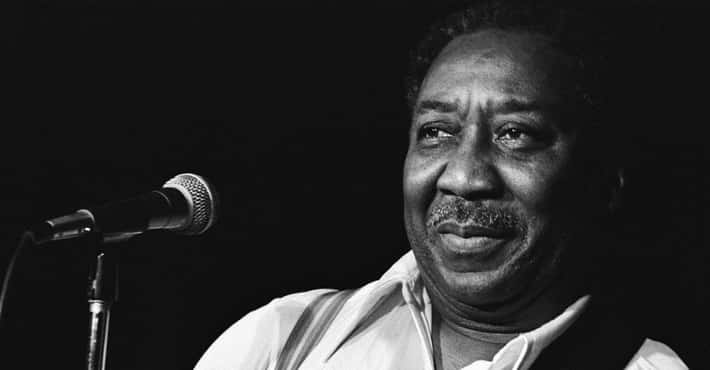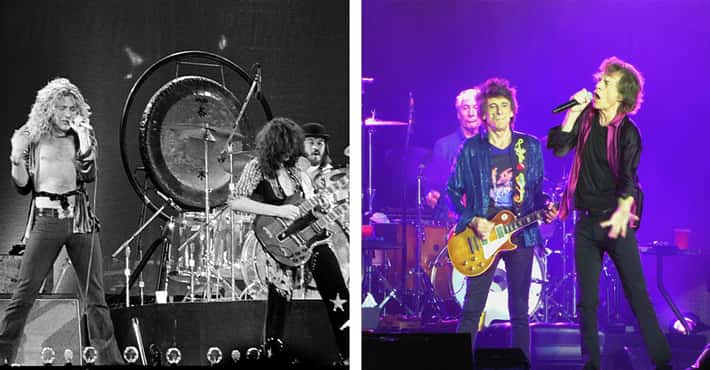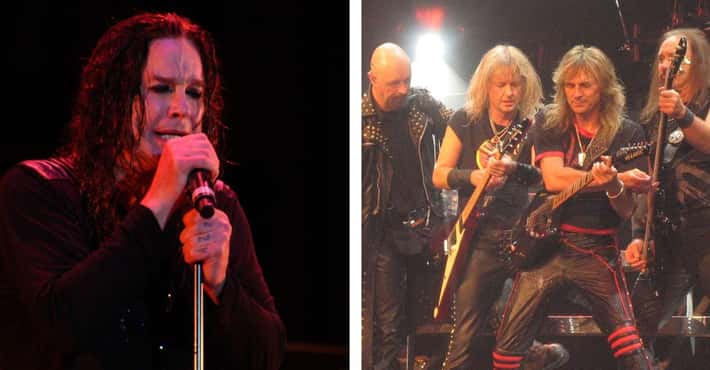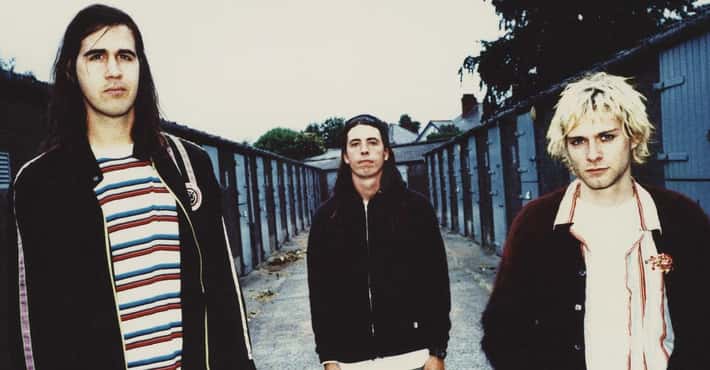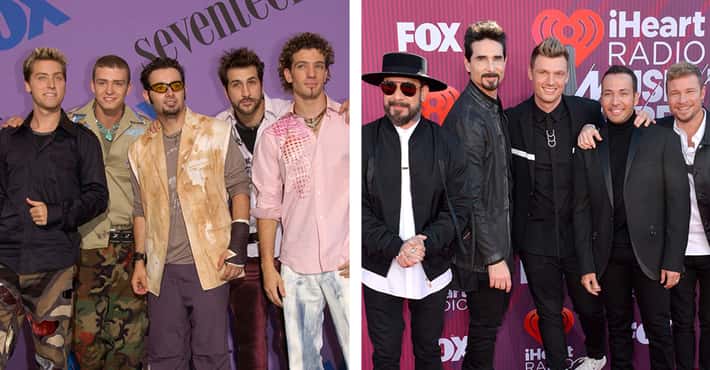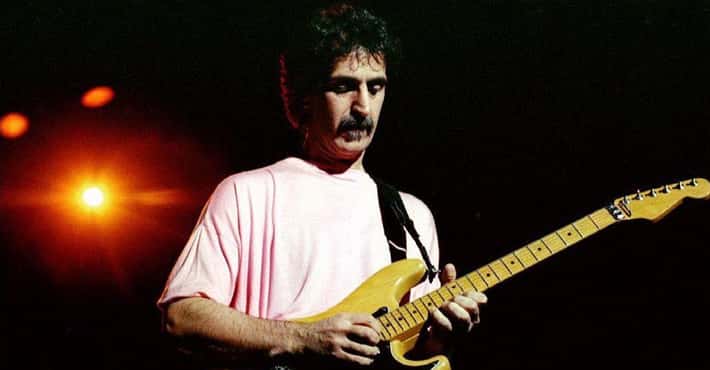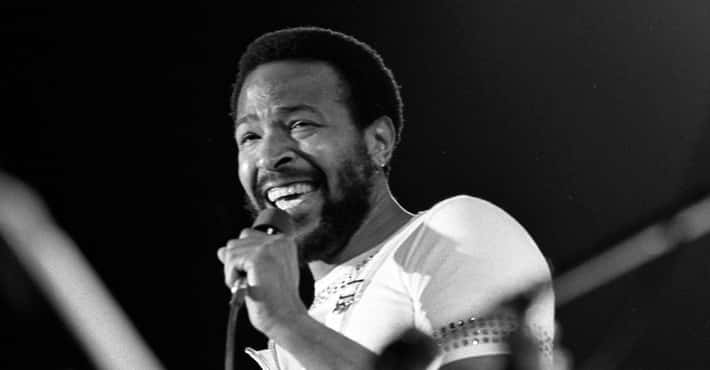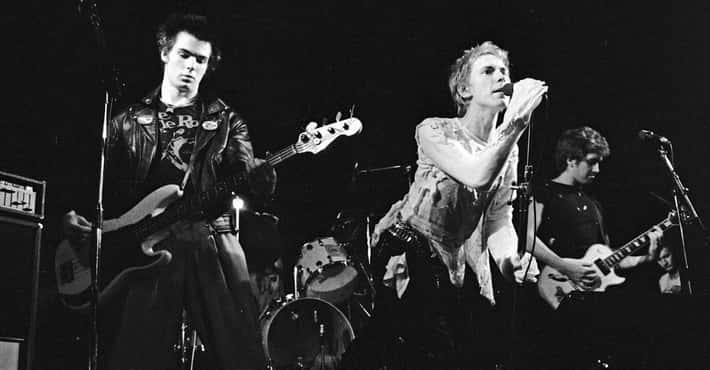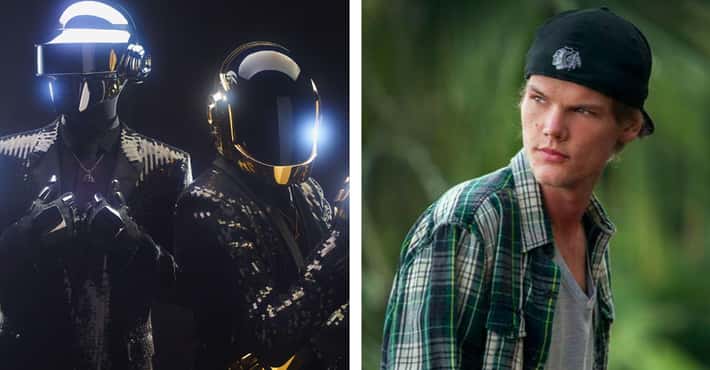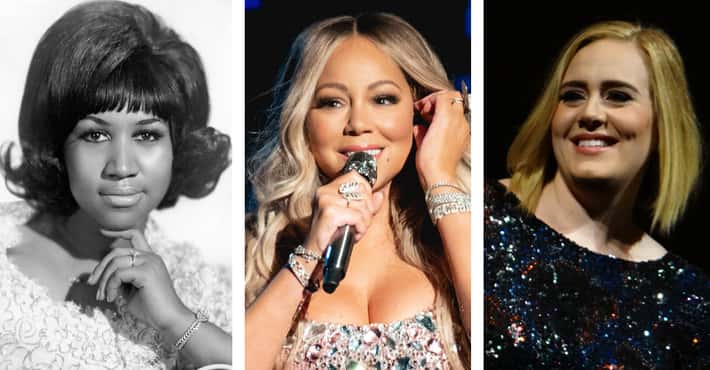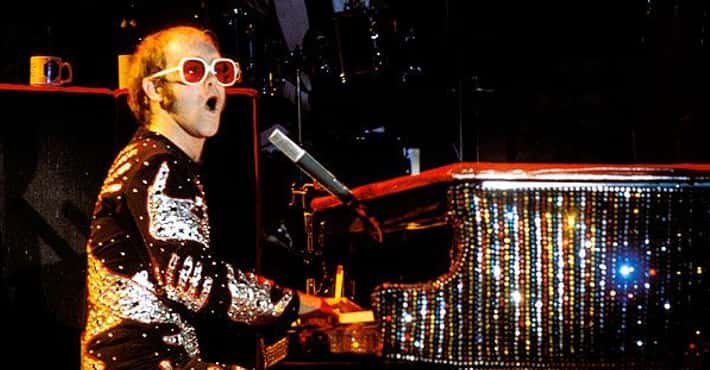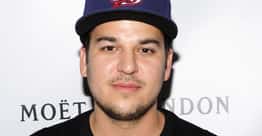The Best Big Bands of All Time
Glenn Miller's innovative arrangements and signature sound catapulted him to the top of the swing era, securing his place among the greatest musicians in history. His ability to blend jazz harmonies with pop melodies made tunes like "In the Mood" and "Moonlight Serenade" instant hits, while his keen ear for talent allowed him to assemble a remarkable ensemble of musicians. Though Miller's career was tragically cut short during World War II, his influence on popular music remains undeniable and continues to inspire generations of musicians.
More Glenn Miller- #78 of 1,150 onThe Greatest Musical Artists Of All Time, Ranked
- #153 of 283 onThe Greatest Live Bands of All Time
- #1676 of 3,182 onThe Most Influential People Of All Time
- 2
Count Basie Orchestra
Founded by the incomparable William "Count" Basie, this orchestra has been synonymous with excellence in jazz since its inception in the 1930s. Known for their impeccable rhythm section, precise ensemble playing, and powerhouse soloists, the Count Basie Orchestra has remained at the forefront of big band music for almost a century. Their unique style – characterized by tight arrangements and blues-infused solos – is still widely imitated today but never quite duplicated.
The "King of Swing" himself, Benny Goodman revolutionized jazz by bringing it into the mainstream and establishing it as a respected art form. As a masterful clarinetist and bandleader, Goodman's relentless pursuit of perfection led to an unparalleled level of musicianship within his ensemble. The groundbreaking Carnegie Hall concert in 1938 solidified his status as a legend in the world of music, showcasing not only his own virtuosity but also that of his band members.
More Benny Goodman- Dig Deeper...The Best Benny Goodman Songs
- #151 of 1,150 onThe Greatest Musical Artists Of All Time, Ranked
- #1966 of 3,182 onThe Most Influential People Of All Time
Few names are as synonymous with jazz as Duke Ellington, whose prolific composing, arranging, and bandleading skills left an indelible mark on American music. With a knack for blending diverse musical styles into cohesive arrangements, Ellington created an unmistakable sound that has endured through generations. His long-standing collaboration with Billy Strayhorn produced some of the most memorable tunes in jazz history, while his commitment to showcasing individual musicians within his band set a precedent for future ensembles.
More Duke Ellington- Dig Deeper...335+ Famous Taurus Historical Figures
- #612 of 1,150 onThe Greatest Musical Artists Of All Time, Ranked
- #9 of 69 onThe Greatest Jazz Pianists of All Time
A true virtuoso on the clarinet, Artie Shaw's innovative approach to big band music earned him a reputation as one of the greatest bandleaders of the swing era. His willingness to experiment with different styles and instrumentation resulted in unique arrangements that showcased both his own technical prowess and the talents of his band members. Shaw's ability to captivate audiences with his charismatic performances made him a household name, and his influence can still be felt in the world of jazz today.
More Artie Shaw- Dig Deeper...The 365+ Most Famous Geminis
- #1 of 71 onThe Greatest Clarinetists of All Time
- #7 of 20 onThe Greatest Swing Jazz Musicians of All Time
Known as the "Sentimental Gentleman of Swing," Tommy Dorsey was a master trombonist and bandleader whose smooth, melodic style helped define the sound of the big band era. With an unerring sense of rhythm and phrasing, Dorsey could make even the most complex arrangements seem effortless, earning him legions of devoted fans. His keen ear for talent led him to discover some of the biggest names in music, including Frank Sinatra, who got his start singing with Dorsey's orchestra.
More Tommy Dorsey- #169 of 1,150 onThe Greatest Musical Artists Of All Time, Ranked
- #273 of 863 onThe 250+ Greatest Rock Bands Of All Time, Ranked
- #266 of 283 onThe Greatest Live Bands of All Time
Count Basie, often referred to as Count Basie, led one of the most preeminent big bands in the history of jazz, known for its impeccable rhythm section, sharp brass arrangements, and ability to swing with ease. Founded in the 1930s, Basie's orchestra featured legendary musicians and vocalists, creating classics like "April in Paris" and "One O'Clock Jump." His legacy includes numerous Grammy Awards, with his band being honored with a Grammy Hall of Fame award for "One O'Clock Jump."
Basie's orchestra is widely regarded as one of the greatest big band acts for its innovative style and significant contribution to the development of jazz. The Count Basie Orchestra set the standard for what a big band ensemble should encapsulate—rhythmic precision, musical sophistication, and an energy that could make any crowd swing. Their lasting influence echoes through the ages, affirming their position as a cornerstone of the big band genre.
More Count Basie- #90 of 1,150 onThe Greatest Musical Artists Of All Time, Ranked
- #18 of 69 onThe Greatest Jazz Pianists of All Time
- #95 of 179 onWhich Artist Would You Bring Back From The Dead To Write One More Song?
- 8
Glenn Miller Orchestra
Carrying on the legacy of its founder, Glenn Miller, this orchestra has remained a leading force in big band music for over eight decades. With an unwavering commitment to preserving Miller's signature sound and style, the Glenn Miller Orchestra continues to delight audiences around the world with their timeless renditions of classic tunes. Their dedication to excellence ensures that Miller's innovative spirit lives on through their performances.
As a trumpet virtuoso and accomplished bandleader, Harry James left an indelible mark on the big band landscape with his powerful playing and distinctive sound. James' skillful blending of jazz and pop elements helped create memorable hits like "You Made Me Love You" and "I've Heard That Song Before," while his ability to assemble top-notch musicians ensured that his band remained a force to be reckoned with throughout the swing era and beyond.
More Harry James- #14 of 90 onThe 95 Best Trumpet Players Of All Time, Ranked
- #60 of 60 onThe Best Swing Bands/Artists of All Time
- #52 of 62 onWho Is The Most Famous James In The World?
Woody Herman's long-lasting impact on big band music can be attributed to his innovative arrangements, exceptional musicianship, and unwavering commitment to excellence. As both a gifted clarinetist and saxophonist, Herman was able to infuse his ensembles with an infectious energy that kept audiences coming back for more. His bands, known as the Herds, were renowned for their tight ensemble playing and impressive soloists, solidifying Herman's place in the pantheon of great bandleaders.
More Woody Herman- #8 of 71 onThe Greatest Clarinetists of All Time
- #5 of 29 onThe Best Musical Artists From Wisconsin
- #20 of 189 onFamous People Buried at Hollywood Forever Cemetery
As one half of the famed Dorsey Brothers, Jimmy Dorsey's skillful alto saxophone playing and dynamic leadership helped establish him as one of the premier bandleaders of the swing era. With hits like "Tangerine" and "Amapola," Dorsey's ensembles showcased his talent for crafting catchy melodies and memorable arrangements. His keen eye for talent also led him to discover some of the era's most promising musicians, ensuring that his bands remained at the forefront of big band music.
More Jimmy Dorsey- #264 of 1,150 onThe Greatest Musical Artists Of All Time, Ranked
- #15 of 60 onThe Best Swing Bands/Artists of All Time
- #41 of 215 onThe 200+ Best Easy Listening Music Artists, Ranked
Widely regarded as one of the greatest drummers of all time, Buddy Rich's virtuosity behind the kit was matched only by his prowess as a bandleader. Known for his explosive solos and unparalleled technique, Rich demanded nothing but the best from himself and those who played alongside him. His relentless pursuit of musical perfection resulted in some of the tightest ensembles in big band history, setting a standard that few could hope to match.
More Buddy Rich- Dig Deeper...The Best Buddy Rich Songs
- #2378 of 3,182 onThe Most Influential People Of All Time
- #3 of 258 onThe 250+ Best Drummers Of All Time, Ranked
A true innovator in every sense of the word, Dizzy Gillespie's contributions to jazz and big band music cannot be overstated. As one of the founding fathers of bebop, Gillespie's virtuosic trumpet playing and revolutionary approach to harmony forever changed the way people thought about jazz composition. His work as a bandleader allowed him to showcase not only his own talents but also those of countless other musicians who would go on to shape the future of jazz.
More Dizzy GillespieAs one of the pioneers of modern drumming, Gene Krupa revolutionized the role of percussion within big band music through his powerful playing and charismatic stage presence. Krupa's innovative techniques, including the use of tom-toms and extended solos, helped elevate the drums from a mere timekeeping instrument to a crucial component of any ensemble. His tenure as a bandleader saw him collaborate with some of the biggest names in jazz, ensuring his lasting influence on the genre.
More Gene Krupa- #255 of 1,150 onThe Greatest Musical Artists Of All Time, Ranked
- #1938 of 3,182 onThe Most Influential People Of All Time
- #8 of 258 onThe 250+ Best Drummers Of All Time, Ranked
There's no overstating the impact that Louis Armstrong had on the world of jazz and big band music. As both a groundbreaking trumpet player and an influential vocalist, Armstrong's unique style and charismatic stage presence made him a global ambassador for American music. With hits like "What a Wonderful World" and "Hello, Dolly!", Armstrong's legacy continues to inspire musicians across all genres.
More Louis Armstrong- Dig Deeper...320 Famous Leo Celebrities
- #29 of 554 onThe 250+ Best Singers Of All Time, Ranked
- #13 of 1,150 onThe Greatest Musical Artists Of All Time, Ranked
Few groups can claim to have had as much impact on popular music as The Andrews Sisters, whose tight harmonies and infectious enthusiasm made them one of the most successful acts of their time. With hits like "Boogie Woogie Bugle Boy" and "Rum and Coca-Cola," the sisters were able to bridge the gap between big band music and mainstream pop, ensuring their lasting appeal to fans of all ages.
More The Andrews Sisters- #132 of 1,150 onThe Greatest Musical Artists Of All Time, Ranked
- #163 of 179 onWhich Artist Would You Bring Back From The Dead To Write One More Song?
- #49 of 115 onThe 100+ Best Female Jazz Singers, Ranked
As one of the most colorful characters in big band history, Cab Calloway's larger-than-life persona and infectious energy made him a beloved figure among audiences and fellow musicians alike. Known for his distinct vocal style and scat singing, Calloway could captivate listeners with his dynamic performances and engaging storytelling. His leadership of the famous Cotton Club Orchestra helped solidify his place as one of the great bandleaders of the swing era.
More Cab Calloway- #213 of 1,150 onThe Greatest Musical Artists Of All Time, Ranked
- #2117 of 3,182 onThe Most Influential People Of All Time
- #108 of 179 onWhich Artist Would You Bring Back From The Dead To Write One More Song?
As a pioneer of the vibraphone in jazz, Lionel Hampton's innovative playing and magnetic stage presence made him an indispensable figure within big band music. His work with Benny Goodman helped establish the vibraphone as a legitimate jazz instrument, while his own ensembles showcased some of the best talent the genre had to offer. Hampton's relentless energy and passion for his craft ensured that his influence would be felt for generations to come.
More Lionel Hampton- Dig Deeper...Actors You May Not Have Realized Are Republican
- #892 of 1,150 onThe Greatest Musical Artists Of All Time, Ranked
- #2931 of 3,182 onThe Most Influential People Of All Time
Though primarily known as an actress, Doris Day's beautiful voice and undeniable charm made her a natural fit for big band music. Her collaborations with Les Brown and His Band of Renown showcased her versatility as a vocalist, effortlessly transitioning between sultry ballads and upbeat swing tunes. Day's ability to captivate audiences with her warmth and sincerity helped make her one of the most beloved performers of her time.
More Doris Day- Dig Deeper...People Magazine Cover Models in the 1950s
- #63 of 340 onThe 340+ Best Female Vocalists Ever, Ranked
- #645 of 1,285 onThe Most Beautiful Women Of All Time
The Swing Sisters were a talented trio of vocalists whose harmonious blend and infectious energy brought a fresh perspective to big band music. Their ability to seamlessly transition between ballads and up-tempo numbers showcased their versatility as performers while their engaging stage presence endeared them to audiences around the world. The Swing Sisters' unique sound continues to be celebrated by fans of all ages.
An accomplished saxophonist and bandleader, Charlie Barnet's distinctive sound and commitment to innovation set him apart from many of his contemporaries. With a penchant for exploring new styles and embracing unconventional instrumentation, Barnet was able to create a unique listening experience that resonated with audiences across the country. His willingness to take risks both musically and personally helped solidify his place among the greats of big band music.
More Charlie Barnet- #689 of 1,150 onThe Greatest Musical Artists Of All Time, Ranked
- #34 of 60 onThe Best Swing Bands/Artists of All Time
- #78 of 373 onFamous Jazz Saxophonists
As the lead vocalist for Glenn Miller's orchestra, Ray Eberle's smooth voice and charismatic stage presence made him one of the most popular singers of his time. With hits like "At Last" and "Imagination," Eberle was able to captivate audiences with his emotional delivery and impeccable phrasing. His collaborations with some of the biggest names in big band music ensured that his legacy would continue long after his time in the spotlight had passed.
As the leader of the Casa Loma Orchestra, Glen Gray was instrumental in helping define the sound of big band music during its heyday. Under Gray's direction, the orchestra became known for its tight ensemble playing and sophisticated arrangements that showcased both their musical prowess and Gray's keen ear for talent. His commitment to excellence ensured that his band would remain at the forefront of popular music throughout their tenure.
As one of the pioneers of modern jazz piano, Earl Hines' innovative playing style had a profound impact on big band music and beyond. Known for his distinctive "trumpet-style" piano technique, Hines was able to seamlessly blend elements of classical music with jazz harmony, creating a sound that was truly ahead of its time. His work as a bandleader allowed him to showcase his talents as both a composer and an arranger, solidifying his place in the pantheon of jazz greats.
More Earl Hines- #43 of 69 onThe Greatest Jazz Pianists of All Time
- #13 of 28 onThe Best Jazz Pianists in the World
- #16 of 20 onThe Greatest Swing Jazz Musicians of All Time
A true renaissance man of jazz, Benny Carter's contributions to big band music spanned not only playing (as an exceptional alto saxophonist and trumpeter) but also composing, arranging, and bandleading. With a career that lasted over six decades, Carter's dedication to his craft helped shape the sound of jazz for generations to come. His innovative approach to harmony and melody made him one of the most respected figures in the world of music.
More Benny Carter- #35 of 49 onThe Greatest Saxophonists of All Time
- #18 of 20 onThe Greatest Swing Jazz Musicians of All Time
- #27 of 69 onThe Greatest Jazz Saxophonists of All Time
As an accomplished composer, arranger, and trumpeter, Neal Hefti's contributions to big band music are both vast and varied. With a knack for crafting memorable melodies and innovative arrangements, Hefti was able to leave an indelible mark on the genre. His work with ensembles like Count Basie's orchestra showcased his talents as both a musician and a creative force within the world of jazz.
As a trailblazing trumpet player, Roy Eldridge's fiery solos and virtuosic technique made him a standout figure within big band music. Often referred to as the "link" between Louis Armstrong and Dizzy Gillespie, Eldridge's unique style bridged the gap between swing and bebop, influencing countless musicians along the way. His work with various ensembles showcased his talents not only as a performer but also as a skilled arranger.
More Roy Eldridge- #31 of 90 onThe 95 Best Trumpet Players Of All Time, Ranked
- #14 of 20 onThe Greatest Swing Jazz Musicians of All Time
- #45 of 60 onThe Best Swing Bands/Artists of All Time
Vaughn Monroe's rich baritone voice, combined with his skills as a bandleader and trumpeter, made him one of the most versatile performers in big band music. Known for hits like "Racing with the Moon" and "Ghost Riders in the Sky," Monroe's unique sound and engaging stage presence helped solidify his place as a beloved figure within popular music. His dedication to entertaining audiences ensured that his legacy would endure long after his time in the limelight had passed.
- 29
Ray Conniff
A gifted trombonist, composer, and arranger, Ray Conniff brought a distinctive sound to big band music through his innovative use of vocal harmonies and lush orchestrations. By combining elements of jazz, pop, and classical music, Conniff created a style all his own that resonated with listeners across generations. His numerous hit recordings showcased not only his talents as a musician but also his ability to connect with audiences on an emotional level.
- 30
Louis Prima, Jr.
As the son of legendary entertainer Louis Prima, Louis Prima Jr. has carried on his father's legacy by bringing high-energy performances and fresh interpretations of classic tunes to audiences around the world. With a dynamic stage presence and undeniable musical talent, Prima Jr. continues to captivate fans with his unique blend of jazz, swing, and rock 'n' roll.
Claude Thornhill's innovative approach to big band music set him apart from many of his contemporaries during the swing era. As a pianist, composer, and bandleader, Thornhill's unique blend of classical and jazz elements created a sophisticated sound that was both innovative and accessible. His influential work with arranger Gil Evans would later serve as the foundation for the "cool jazz" movement of the 1950s.
As a skilled drummer and charismatic bandleader, Ray McKinley brought a unique energy to big band music that set him apart from many of his peers. Known for his engaging stage presence and playful approach to rhythm, McKinley's ensembles were renowned for their tight ensemble playing and infectious enthusiasm. His dedication to entertaining audiences ensured that his influence on the genre would continue long after his time in the spotlight had passed.
With his smooth vocal stylings and natural charisma, Vic Damone quickly became one of the most beloved crooners of the big band era. His ability to convey deep emotion through song made him a favorite among audiences, while his collaborations with some of the biggest names in music ensured his lasting legacy within the genre. Damone's timeless voice continues to be celebrated by fans of all ages.
More Vic Damone- #390 of 554 onThe 250+ Best Singers Of All Time, Ranked
- #146 of 200 onThe Greatest Male Pop Singers Of All Time
- #15 of 84 onThe Greatest Crooners Of All Time
Ted Heath's exceptional musicianship and keen ear for talent helped establish him as one of Britain's leading bandleaders during the swing era. Renowned for their tight ensemble playing and impressive soloists, Heath's ensembles set a high standard for excellence within big band music. With an unwavering commitment to their craft, Heath's bands left an indelible mark on the world of jazz.
As one of the premier vocal groups of their time, The King Sisters brought tight harmonies and infectious energy to big band music. With their unique blend of jazz and pop sensibilities, the sisters were able to bridge the gap between genres and captivate audiences of all ages. Their lasting appeal has ensured that their influence on popular music continues to be felt today.
This Canadian ensemble, known for their spirited performances and exceptional musicianship, helped keep the flame of big band music alive during an era when many thought it was fading away. With a repertoire that spanned classic swing tunes to contemporary arrangements, The Spitfire Band showcased not only their own talents but also the enduring appeal of big band music.
With a velvety voice and undeniable charm, Steve Lawrence quickly established himself as one of the premier vocalists in big band music during its golden age. His effortless delivery and emotional connection to each song endeared him to audiences around the world, while his collaborations with some of the biggest names in music solidified his place as a true icon within the genre.
More Steve Lawrence- #138 of 200 onThe Greatest Male Pop Singers Of All Time
- #24 of 84 onThe Greatest Crooners Of All Time
- #36 of 60 onThe Best Swing Bands/Artists of All Time
As a gifted vocalist and consummate entertainer, Tony Martin brought a unique blend of sophistication and warmth to big band music. With his smooth voice and engaging stage presence, Martin was able to captivate audiences around the world with his heartfelt performances. His collaborations with some of the biggest names in music ensured his lasting legacy within the genre.
More Tony Martin- #41 of 84 onThe Greatest Crooners Of All Time
- #36 of 73 onWho Is The Most Famous Martin In The World?
- #25 of 135 onCelebrity Death Pool 2012
Frankie Carle's skill as a pianist and bandleader made him one of the most respected figures within big band music during its heyday. Known for his intricate arrangements and melodic playing style, Carle's ensembles were renowned for their tight ensemble playing and attention to detail. His dedication to excellence helped ensure that his influence on the genre would continue long after his time in the limelight had passed.
Founded by pianist Toshiko Akiyoshi and saxophonist/flutist Lew Tabackin, this groundbreaking ensemble brought a unique fusion of Eastern and Western musical styles to big band music. As both skilled composers and musicians, Akiyoshi and Tabackin created innovative arrangements that showcased not only their own talents but also those of their talented ensemble members. Their commitment to pushing musical boundaries has earned them a place among the greats of jazz history.
As an accomplished trombonist, violinist, and bandleader, Ted Weems left an indelible mark on big band music during its golden age. With an infectious energy and undeniable talent for crafting catchy melodies, Weems' ensembles were renowned for their engaging performances and polished sound. His dedication to entertaining audiences ensured that his influence on the genre would endure long after his time in the spotlight had passed.
With a voice as smooth as silk and a natural talent for connecting with audiences, Jack Jones quickly became one of the most beloved vocalists in big band music. His effortless delivery and emotional depth endeared him to listeners around the world, while his collaborations with some of the biggest names in music solidified his place as a true icon within the genre.
More Jack Jones- #608 of 1,150 onThe Greatest Musical Artists Of All Time, Ranked
- #18 of 40 onOld Singers You Didn't Realize Are Still Alive
- #49 of 215 onThe 200+ Best Easy Listening Music Artists, Ranked
- 43
Syd Lawrence
As a skilled trumpeter and bandleader, Syd Lawrence helped carry on the tradition of big band music in Britain during its golden age. Known for his attention to detail and commitment to excellence, Lawrence's ensembles were renowned for their tight ensemble playing and impressive soloists. His dedication to preserving the legacy of big band music has earned him a place among the greats of jazz history.
As an accomplished trombonist, composer, and arranger, Don Sebesky left an indelible mark on big band music through his innovative approach to harmony and orchestration. By seamlessly blending elements of jazz, classical, and pop music, Sebesky was able to create a unique sound that resonated with listeners across generations. His numerous hit recordings showcased not only his talents as a musician but also his ability to connect with audiences on an emotional level.
Doc Cheatham's exceptional trumpet playing and engaging stage presence made him one of the most revered figures within big band music. With a career that spanned over seven decades, Cheatham's dedication to his craft helped shape the sound of jazz for generations to come. His innovative approach to harmony and melody made him one of the most respected figures in the world of music.
As an accomplished trombonist and bandleader, Buddy Morrow brought a unique energy and style to big band music during its heyday. Known for his powerful playing and tight arrangements, Morrow's ensembles were renowned for their dynamic performances and polished sound. His dedication to entertaining audiences and preserving the legacy of big band music ensured that his influence on the genre would continue long after his time in the spotlight had passed.
- 47
Joe Loss
A highly respected bandleader during the golden age of big band music, Joe Loss was known for his keen ear for talent and commitment to excellence. With ensembles renowned for their tight ensemble playing and impressive soloists, Loss was able to create memorable performances that captivated audiences around the world. His lasting impact on big band music is still felt today.
- 48
Bob Curnow
As a skilled trombonist, composer, and arranger, Bob Curnow left an indelible mark on big band music through his innovative approach to harmony and orchestration. By seamlessly blending elements of jazz, classical, and pop music, Curnow was able to create a unique sound that resonated with listeners across generations. His numerous hit recordings showcased not only his talents as a musician but also his ability to connect with audiences on an emotional level.
With a smooth voice and undeniable charm, Guy Mitchell quickly became one of the most beloved vocalists in big band music. His ability to captivate audiences with his heartfelt performances made him a favorite among listeners, while his collaborations with some of the biggest names in music solidified his place as a true icon within the genre. Mitchell's timeless voice continues to be celebrated by fans of all ages.
- Carla Bley (born Lovella May Borg) is an American jazz composer, pianist, organist and bandleader. An important figure in the free jazz movement of the 1960s, she is perhaps best known for her jazz opera Escalator over the Hill (released as a triple LP set), as well as a book of compositions that have been performed by many other artists, including Gary Burton, Jimmy Giuffre, George Russell, Art Farmer, John Scofield and her ex-husband Paul Bley.More Carla Bley
- #560 of 1,157 onThe Greatest Musical Artists of All Time
- #1 of 54 onWho Is The Most Famous Carla Or Karla In The World?
- #44 of 54 onThe Best Female Composers Ever, Ranked
- 51
Max Kaminsky
Max Kaminsky (September 7, 1908 – September 6, 1994) was a jazz trumpeter and bandleader. - 52
Symphony Nova Scotia
As one of Canada's premier orchestras, Symphony Nova Scotia has played an essential role in keeping the spirit of big band music alive by incorporating it into their diverse repertoire. Their collaborations with jazz musicians and ensembles showcase not only their own exceptional musicianship but also the enduring appeal of big band music across various genres.
- Herbie Fields (May 24, 1919 – September 17, 1958) was an American jazz musician. He attended New York's famed Juilliard School of Music (1936–38) and served in the U.S. Army from 1941 to 1943.
- Frederick L. Guy (May 23, 1897, Burkeville, Virginia - Dec. 22, 1971) was an American jazz banjo player and guitarist. Guy was raised in New York City. He played guitar and banjo with Joseph C. Smith's Orchestra. In the early 1920s, he joined Duke Ellington's Washingtonians, switching from banjo to guitar in the early 1930s. He remained with Ellington's orchestra until 1949. He retired, moved to Chicago, and for twenty years ran a ballroom. In 1971, he committed suicide.
- 55
Ronnie Verrell
Ronald 'Ronnie' Thomas Verrell (21 February 1926 – 22 February 2002) was an English jazz drummer. He played in two of the United Kingdom's "most famous" big bands, The Ted Heath Orchestra and The Syd Lawrence Orchestra. Verrell also worked extensively in television, including as a drummer in Jack Parnell's ATV Orchestra and Sunday Night at the London Palladium. He also provided the drumming for The Muppet Show's Animal, and was a "Skinnerette" on The Frank Skinner Show. The Scotsman called Verrell a "driving band drummer" and an "exciting soloist". The Daily Telegraph said Verrell had a "rare combination of craftsmanship and bravura showmanship" and called him "Britain's best-known big band drummer for half a century". - David Louis Bartholomew (December 24, 1918 – June 23, 2019) was an American musician, bandleader, composer, arranger, and record producer. He was prominent in the music of New Orleans throughout the second half of the 20th century. Originally a trumpeter, he was active in many musical genres, including rhythm and blues, big band, swing music, rock and roll, New Orleans jazz, and Dixieland. In his induction into the Rock and Roll Hall of Fame, he was cited as a key figure in the transition from jump blues and swing to R&B and as "one of the Crescent City's greatest musicians and a true pioneer in the rock and roll revolution."Many musicians have recorded Bartholomew's songs, but his partnership with Fats Domino produced some of his greatest successes. In the mid-1950s they wrote more than forty hits for Imperial Records, including the Billboard number one pop chart hit "Ain't That a Shame". Bartholomew's other hit songs as a composer include "I Hear You Knocking", "Blue Monday", "I'm Walkin'", "My Ding-A-Ling", and "One Night". He was a member of the Songwriters Hall of Fame, the Rock and Roll Hall of Fame, and the Louisiana Music Hall of Fame.
- Dave Edwards (January 11, 1941 – August 12, 2000) was an American big band-style musician who most notably was the lead alto saxophonist and multireedist for the long running weekly television series, The Lawrence Welk Show from 1968 through 1979.
- 58
Herbie Phillips
Herbert Daly Phillips, known professionally as Herbie Phillips (April 20, 1935 – September 13, 1995), was an American jazz trumpeter, composer, and arranger. He spent much of his life working in Las Vegas. He played trumpet in bands led by Louie Bellson, Buddy Morrow, and Billy May. He composed "Little Train", which was recorded by the Buddy Rich Big Band. He worked as trumpeter and conductor for Frank Sinatra and Frank Sinatra Jr. - 59
John Serry, Sr.
John Serry Sr. (born John Serrapica; January 29, 1915 – September 14, 2003) was an American concert accordionist, arranger, composer, organist, and educator. He performed on the CBS Radio and Television networks and contributed to Voice of America's cultural diplomacy initiatives during the Golden Age of Radio. He also concertized on the accordion as a member of several orchestras and jazz ensembles for nearly forty years between the 1930s and 1960s. - Henry Adler (June 28, 1915 – September 30, 2008) was an American jazz drummer, teacher, author, and publisher. He taught drummer Buddy Rich how to read music and co-wrote Buddy Rich's Modern Interpretation of Snare Drum Rudiments, published in 1942.


